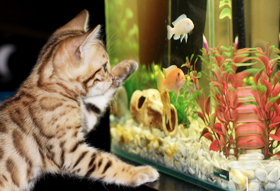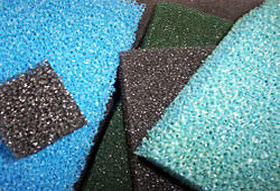
Aquatic filter foam guide

Pond and tank filters are essential for ensuring the clarity and cleanliness of water for fish and other organisms by helping to promote a balanced biological ecosystem. These filters assist with the removal of waste products and other debris for the water, ensuring the health of the pond or tank environment. There are a number of different filters used, including mechanical and biological systems, and each have different levels of maintenance and efficiency depending on their type.
Filters of this type are aided by a type of polyurethane foam (usually with a polyester polyol or polyether) that undergoes a reticulation process to produce an open-cell foam with a dense and complex cell structure. This process creates a foam that is resistant to material breakdown with a high oxygen resistance, making it most suitable for a filtration system.

Reticulated polyether aquatic foam plays a crucial role in mechanical filters and is considered by many as the most popular and effective method of water filtration. This foam is used to sieve out solid waste, algae, dirt and other grit by drawing water through it using a submersed pump. Run permanently or on occasion, these filters are cost effective to run and are available in a range of sizes to suit indoor tanks and outdoor ponds as appropriate. However, the size of the filter used is not determined by the size of the pond or tank, but by the number of fish and other living organisms in the space. For this reason, tanks and ponds with only a few fish should not require a filtration system at all, though are recommended.
Biological filters are not appropriate for all environments and are commonly used in outdoor ponds only. This makes mechanical filters the preferred solution for many. But are mechanical filters as effective? In short, yes they are.
Reticulated polyether foam is a popular choice for all mechanical filtering systems because it is chemically and therefore structurally stable under water for prolonged periods of time. Resistant to fresh and salt water, bacteria, humidity, oils and lubricants, this aquatic foam assists with the breakdown of bio-waste, helps to protect the pumping system from damage caused by debris, and works to reduce the level of nutrients that promote algae growth. Furthermore, its dense and complex material structure helps to entrap smaller particles suspended in the water which are more difficult to see with the naked eye.

Mechanical filtration systems are most appropriate for smaller environments such as tanks and over basic support to ensure the cleanliness of a tank and the health of fish. However, biological filtration should also be considered for those with outdoor ponds and larger aquatic environments as a lack of biological filtration is the number one cause of death for fish in aquatic environments. In biological systems, reticulated polyether foam is also used as a bacterial carrier to improve both the active surface and efficiency of the bioreactor (e.g. the natural organisms in a tank that are simply left present by aquatic foam).
eFoam supplies high-quality aquatic solutions for individual and commercial tanks and ponds and has been one of the leading advisers on foam products for several decades. Should you wish to discuss your aquatic foam requirements (mechanical, biological or both) with one of our knowledgeable advisors, please contact us.

